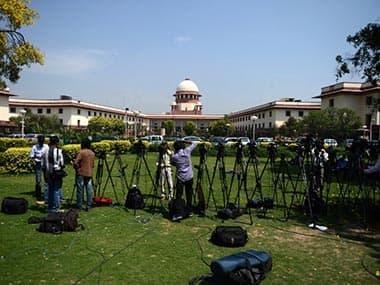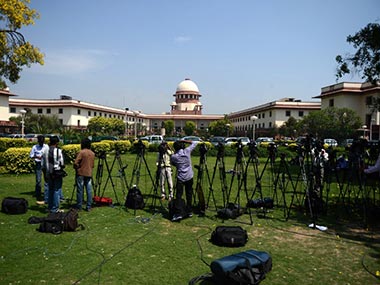After the Supreme Court verdict of 16 October that declared the National Judicial Appointments Commission (NJAC) as unconstitutional, we have virtually gone back to the collegium system. The five-judge bench of the apex court has unfairly refused to allow the government to appeal against its flawed judgment. The reality is that judges have decided to award themselves the right to decide who their brethren should be, with no external checks. It is also likely that the bench headed by Justice JS Khehar gave this harsh judgment in the context of the current political situation where the BJP and Congress are not on talking terms. So passing a new NJAC law, even with changes, may be extremely difficult in the Rajya Sabha. So, what can the NDA government do? The first option to be explored is for the BJP to work out a direct deal with Congress on the broad contours of a new legislation. There may be some political give and take in this, but it must be tried. However, the Congress may see more advantage in embarrassing the BJP than doing something that is right in the context of the Supreme Court’s intransigence on judicial appointments. The Congress has already made the ridiculous comment that “the judgment implicitly reflects the lack of confidence in this government” as though it is the judiciary’s job to express confidence (or the lack of it) in favour of (or against) the government when the latter is directly accountable to the people. [caption id=“attachment_2472302” align=“alignleft” width=“380”]
 Image courtesy: AFP[/caption] The obvious answer is to file a new case challenging the constitutional validity of the collegium system. The NJAC has been struck down, but this need not be construed as a vote of confidence in the collegium system or its constitutional validity. In fact, during hearings on the NJAC the bench itself observed that its job was not to compare the NJAC with the collegium, but to confirm or reject the constitutional validity of the NJAC. In other words, the constitutional validity of the collegium system has not been decided yet. This is the weak point in the judgment which the government must attack. Here is what the constitution says about how judges should be appointed. Article 124 (2)” “Every Judge of the Supreme Court shall be appointed by the President by warrant under his hand and seal after consultation with such of the judges of the Supreme Court and of the high courts in the states as the President may deem necessary for the purpose and shall hold office until he attains the age of 65 years: “Provided that in the case of appointment of a judge other than the chief Justice, the Chief Justice of India shall always be consulted.” (Italics mine)”. So, if the NJAC is unconstitutional, so is the collegium. In fact, even more so. There is no place for a collegium in the constitutional scheme of things. The constitution clearly places the onus on the government (ie, the President) to consult the CJI or other judges “as the President may deem necessary.” The government must demand a return to this original position to challenge the collegium system. The collegium is a naked attempt by the court to arrogate to itself the power to appoint judges by excluding the executive, and is thus even less constitutionally valid than the NJAC which at least tries to strike a balance between executive and judiciary and has been legislated by both houses of parliament and 20 state legislatures. The Supreme Court may refuse to entertain the government’s appeal, but it is still the right approach as any refusal to re-examine the collegium system would show up the court as being interested only in its vested interests. The Supreme Court has tried to sidestep this by starting hearings on improving the collegium system, but the government should not fall into the trap. It has to seek another bench to challenge the validity of the collegium. If the challenge is accepted, there can be a stay on further judicial appointments too, or a temporary truce while the case is being heard – as was the case during the NJAC hearings. There are, of course, more sly tactics the government can adopt if the court tries to brush aside all concerns about its NJAC judgment. The government could delay and probe decisions of the collegium, raise queries, put judges under the scanner and send reports on judges not found fit. It can also scrutinise the relationships between collegium members and proposed appointees. Justice Kurian Joseph, for example, has alleged that previous collegium members favoured kin over deserving people. And Justice J Chelameswar pointed out how the collegium made a big boo-boo by recommending the name of PD Dinakaran for elevation to the Supreme Court when he had allegedly indulged in questionable land dealings. The government may have lost the battle, but the war is still waiting to be waged.
Image courtesy: AFP[/caption] The obvious answer is to file a new case challenging the constitutional validity of the collegium system. The NJAC has been struck down, but this need not be construed as a vote of confidence in the collegium system or its constitutional validity. In fact, during hearings on the NJAC the bench itself observed that its job was not to compare the NJAC with the collegium, but to confirm or reject the constitutional validity of the NJAC. In other words, the constitutional validity of the collegium system has not been decided yet. This is the weak point in the judgment which the government must attack. Here is what the constitution says about how judges should be appointed. Article 124 (2)” “Every Judge of the Supreme Court shall be appointed by the President by warrant under his hand and seal after consultation with such of the judges of the Supreme Court and of the high courts in the states as the President may deem necessary for the purpose and shall hold office until he attains the age of 65 years: “Provided that in the case of appointment of a judge other than the chief Justice, the Chief Justice of India shall always be consulted.” (Italics mine)”. So, if the NJAC is unconstitutional, so is the collegium. In fact, even more so. There is no place for a collegium in the constitutional scheme of things. The constitution clearly places the onus on the government (ie, the President) to consult the CJI or other judges “as the President may deem necessary.” The government must demand a return to this original position to challenge the collegium system. The collegium is a naked attempt by the court to arrogate to itself the power to appoint judges by excluding the executive, and is thus even less constitutionally valid than the NJAC which at least tries to strike a balance between executive and judiciary and has been legislated by both houses of parliament and 20 state legislatures. The Supreme Court may refuse to entertain the government’s appeal, but it is still the right approach as any refusal to re-examine the collegium system would show up the court as being interested only in its vested interests. The Supreme Court has tried to sidestep this by starting hearings on improving the collegium system, but the government should not fall into the trap. It has to seek another bench to challenge the validity of the collegium. If the challenge is accepted, there can be a stay on further judicial appointments too, or a temporary truce while the case is being heard – as was the case during the NJAC hearings. There are, of course, more sly tactics the government can adopt if the court tries to brush aside all concerns about its NJAC judgment. The government could delay and probe decisions of the collegium, raise queries, put judges under the scanner and send reports on judges not found fit. It can also scrutinise the relationships between collegium members and proposed appointees. Justice Kurian Joseph, for example, has alleged that previous collegium members favoured kin over deserving people. And Justice J Chelameswar pointed out how the collegium made a big boo-boo by recommending the name of PD Dinakaran for elevation to the Supreme Court when he had allegedly indulged in questionable land dealings. The government may have lost the battle, but the war is still waiting to be waged.
If NJAC is invalid, collegium is even more so: Govt has lost a battle, but not the war
R Jagannathan
• October 17, 2015, 11:25:04 IST
The collegium system is even more unconstitutional than the NJAC. The government, which lost the NJAC battle, must now take the war to challenge the collegium system. The Supreme Court has delivered a self-serving verdict
Advertisement
)